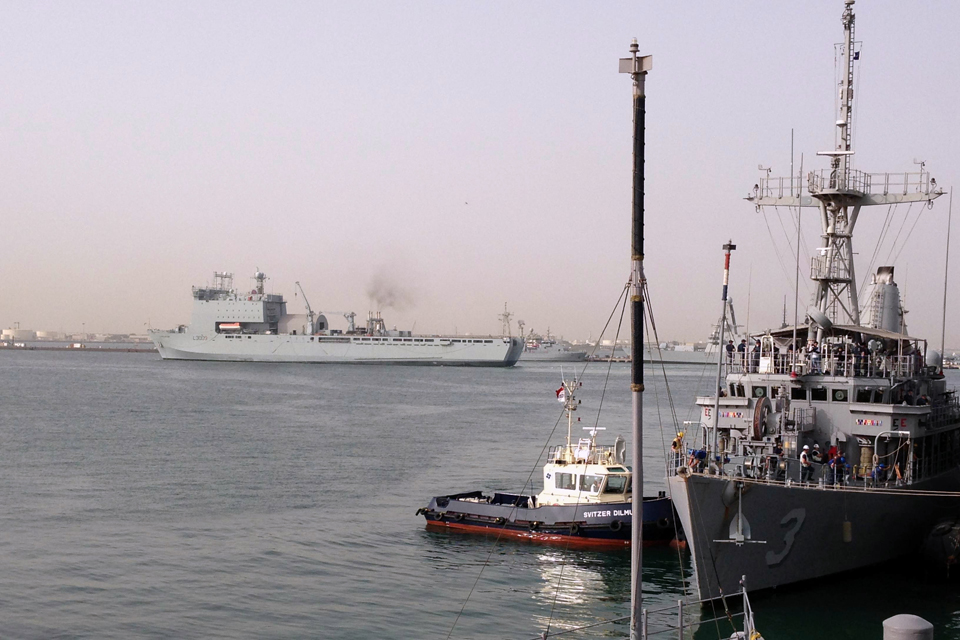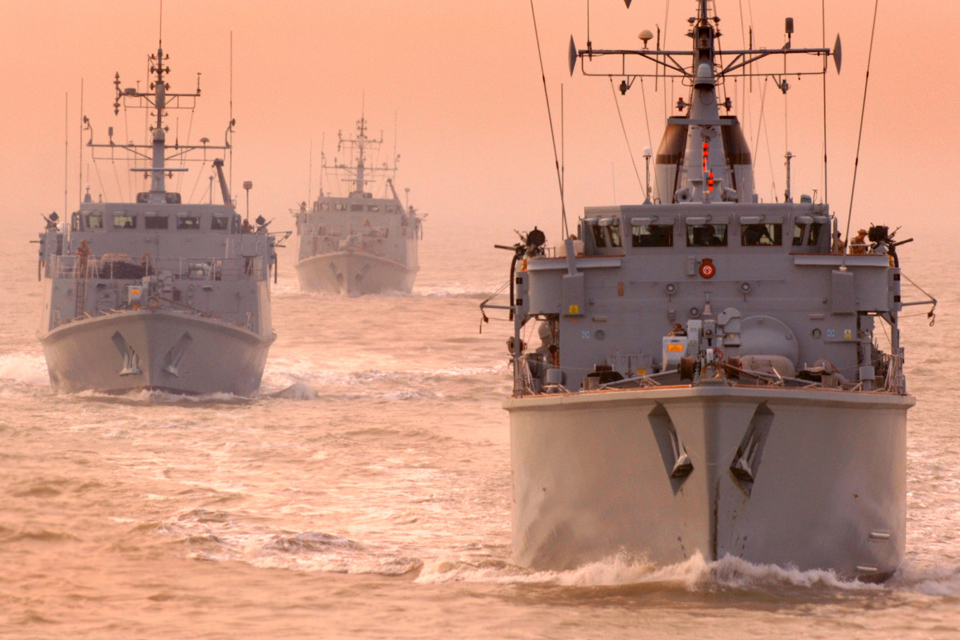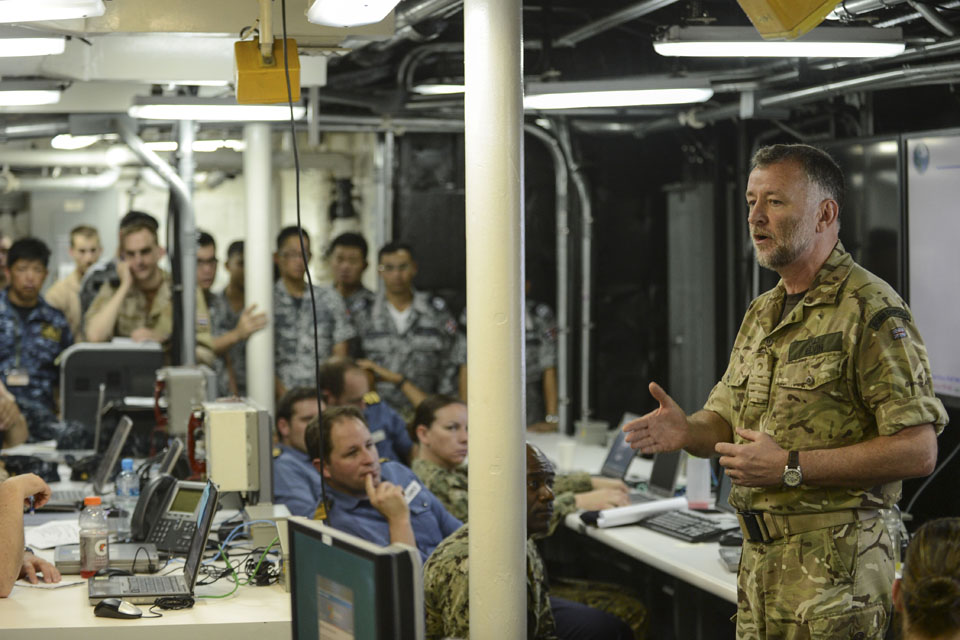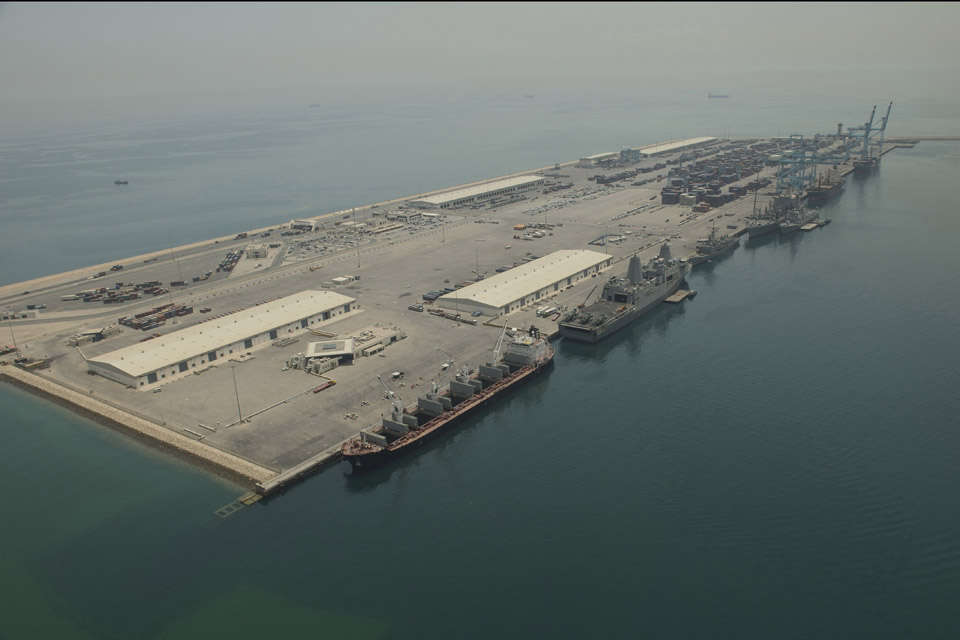Royal Navy joins 41-nation Gulf minehunting exercise
UK warships have joined multinational forces in Bahrain to take part in the second International Mine Countermeasures Exercise (IMCMEX).
![Warships moored at Bahrain for International Mine Countermeasures Exercise 2013 [Picture: Mass Communication Specialist 1st Class Michael Sandberg, US Navy]](https://assets.publishing.service.gov.uk/media/5a61fba740f0b63b5e495226/s300_20130516bahrain01.jpg)
Warships moored at Bahrain for International Mine Countermeasures Exercise 2013
IMCMEX 2013 is the largest exercise ever staged to deal with the threat of mines in the Gulf region.
Six ships and more than 600 sailors from the Royal Navy are taking part in the 2-week test of the response of the world’s nations and navies.

RFA Cardigan Bay departs Mina Salman Pier to take part in International Mine Countermeasures Exercise 2013 [Picture: Lieutenant Marissa Myatt, US Navy]
Thirty-five ships, diving teams and mine warfare experts from across the world accepted the invitation to the second IMCMEX, which is being staged from the Gulf to the Arabian Sea.
The aim of the exercise is to raise awareness of mines and the real danger they pose to the safe passage of shipping. This was demonstrated in 2011 off the coast of Libya when pro-Gaddafi forces tried to block the port of Misurata with mines, which the Royal Navy minehunter HMS Brocklesby found and dealt with.
Four British minehunters – HMS Ramsey, HMS Shoreham, HMS Quorn and HMS Atherstone, plus Royal Fleet Auxiliary vessel Cardigan Bay and Type 45 destroyer HMS Dragon, are taking part. The UK is also providing mine warfare battle staff, diving teams and medical experts.

HMS Atherstone (front) leads UK minehunters (library image) [Picture: Leading Airman (Photographer) Chris Winter, Crown copyright]
The Royal Navy is joined on the exercise by mine warfare experts from across the globe, including US minehunting helicopters, specialist dive teams, warships and robot submarines.
The exercise follows the inaugural IMCMEX last September. Although still focused on mine countermeasures, it includes maritime security operations and maritime infrastructure protection events, recognising that maritime security for trade, energy and commerce extends from the port of origin to the port of arrival.
This year, for the first time, the exercise is being run by the International Maritime Exercise Force (IMEF), a multinational partnership of contributing nations. The IMEF is led by Commodore Simon Ancona of the Royal Navy, UK Maritime Component Commander and Deputy Commander Combined Maritime Forces.

Captain Andy Elvin, Royal Navy, speaks to multinational Service personnel aboard the USS Ponce in Bahrain [Picture: Mass Communication Specialist 1st Class Gary Keen, US Navy]
Commodore Ancona said:
Over 40 nations, 35 ships, 18 unmanned underwater vehicles and 6,500 servicemen and women are involved in this undertaking. The serials in which they are exercising are focused on an issue of fundamental importance to every nation – the maintenance of the free-flow of legitimate trade and energy at sea.
This exercise will allow the Royal Navy to operate with partners, practising skills that are among those that define its role. Mine countermeasures and maritime security operations are about the freedom of the seas, the arteries along which the life blood of global commerce and energy flow.

International warships, including RFA Cardigan Bay and HMS Dragon, moored in Bahrain [Picture: Mass Communication Specialist 1st Class Michael Sandberg, US Navy]
Commodore Ancona added:
There is a growing realisation that shipping is vulnerable. Old lessons are being relearned. We need to be able to fight the mine threat whenever and wherever it rears itself.
Any interruption of the choke points of the world matters to everyone. Thirty per cent of seaborne oil comes through the Strait of Hormuz – up to 17 million barrels a day. Suez, Bab-el-Mandeb, the Strait of Malacca are all equally important. Any blockage has an impact on world trade – and everyone feels that cold breeze.
Vice Admiral John Miller, Commander US 5th Fleet, added:
We’re very pleased to see that more than 40 nations have joined us here to take part in this opportunity to enhance international naval capability to preserve freedom of navigation in international waterways.